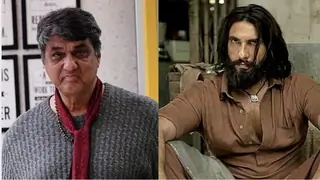Excellent article....have highlighted some parts which I found rather interesting
Diverse strains
SHUBHA MUDGAL
CONTEMPORARY discussion and analysis of Indian music, and the challenges it faces in modern times, inevitably leads to the constant depressing refrain that with each passing day it continues to deteriorate and suffer in terms of quality and content. The consensus in most cases seems to be that old is sure to be gold and the new or contemporary must necessarily be deemed trash and dumped, if not bitterly criticized.
While scholars of Indian music have defined and written of several different categories of music in India, this attempted overview focuses primarily on art music or what is popularly known as classical music, folk and tribal music, and modern popular including film music, 'fusion' music and the more recent Indipop genre. Despite having stated these categories, it is virtually impossible to contain any music, least of all Indian music in such neatly labelled and organized categories, and hence there are constant spillovers. It is perhaps only in the shelves of music stores, or in the chapters of books on music that these categories remain clearly demarcated.
Elsewhere, in the actual practice of music, there is and has always been liberal give and take, borrowing, lending and adaptation. Sections of qawwali repertoire find their way into khayal repertoire aka the celebratory Bahar composition, 'Sakalban phool rahi sarson'. The thumri and dadra repertoire has generous doses of folk music; thumri diva Naina Devi often pointed out to disciples the influence of haveli sangeet (the music of the Krishna temples of the Vaishnava cult) on thumri.
Film music in India has from its early days generously helped itself to folk forms, usually without acknowledgement, a practice that continues to date. A recent instance of such a tendency is the unabashed incorporation of 'nimbuda nimbuda', a Rajasthani langa and manganiyar song, in a Bollywood blockbuster. Indipop, on the other hand, could as easily be renamed Punjabi pop since a majority of chartbusters combine Punjabi bhangra beats and melodies with hip-hop. More than ever before, mixing, matching, sharing, blending, adapting, fusing, collaborating and experimenting is the order of the day much to the chagrin of the purists and traditionalists who prefer to forget that the ability to adapt and absorb from diverse influences has always been a principal characteristic of Indian music.
This large-hearted quality of Indian music is amply evident not only in its changing and evolving form and repertoire, but even among its current practitioners who today range from hereditary musicians to first generation musicians such as myself, and even non-Indian scholars and performers. Today one need not belong to a family of musicians to be able to study music. Knowledge, that was once transmitted orally only to family members of hereditary musicians, is now available to any dedicated seeker at institutions that exclusively teach music as well as from other sources, a fact that was initially deplored by hereditary musicians who considered this unwelcome invasion from outsiders a threat to their identity and existence.
Over the years, this tension has dissolved and it is now common to hear a first-generation Indian musician perform in concert on the same platform as a gharanedar musician of blue-blooded musical lineage. Furthermore, scores of non-Indian students and musicians shuttle between India and their homes across the world to research and gain insight into Indian music. It may not be long before India decides to bestow honorifics such as Pandit and Ustad on sarodiyas such as Ken Zuckerman (Switzerland) and Adrian McNeill (Australia), or bansuri player Steve Gorne (USA)! The community of Indian musicians is therefore galloping in size, as is the geographical territory in which it is heard, practised and studied.
It is also worth mentioning that with the rapid growth in digital technology, there has emerged a new community of non-musicians who do not sing, play, write or perform music, and yet manage to make music through machinery and computerized gadgets. This breed of musicians is quite unique! Formally untrained in any musical system or discipline, whether Indian, Western, Asian or African, the computer-musician is unable to play a single note on any instrument but is adept at sampling one through machines. He then arranges a melody on the hard disk of his computer, which in turn offers him several options to choose from. He can fade in, fade out, tune an instrument, add a note, and edit another – all with a single click of his computer-mouse.
Editing facilities in recording studios can wipe away, without a trace, any unwanted tripping and faltering on the part of the musicians, leaving behind a perfect but altered performance. Even off-key passages or false notes can be corrected with the use of pitch correctors, so that you need not sing or play in tune any longer! You can speed up your taans, add a little huskiness to your tone, and much more – all with a little help from the magical machines! You can now add to the community of Indian musicians the recording artiste, whose live performance may not exactly match the skill and precision of his manipulated recorded performances.
With gadgets come new musical forms like Trance and the Asian Underground. Mixing of live and computer manipulated sound has resulted in some of the most commercially successful musical experiments that have catapulted Indian and Asian musicians to celebrity status. An Indian flavour pervades the international music market. Strains of the sitar, tabla, and alaap can be heard in the most unlikely of situations, from a Kubrik movie to a television commercial for mobile phones!
All seems well and Indian music seems to hold sway over the world. But, despite the steady rise in the popularity of Indian music, more and more societies are set up to promote and propagate India's arts, and experts sit with frowns on worried brows to work out strategies to save Indian music from imminent death. The vidwans claim that music is no longer what it used to be; that if western culture is not restrained and allowed to contaminate the purity and sanctity of Indian culture, we will lose the very foundation of our music.
And yet, every television channel in the country continues to do little to promote traditional music and the arts, while countdown shows flood the channels regularly with an unfailing monotony. Who sanctions these programmes if not the powers that be? Are we not being characteristically hypocritical and extreme in our attitudes? If the nation believes in preserving its rich cultural heritage and is proud of its artistic traditions, why is it so difficult to get patronage for classical and folk music? Why is there no single channel that caters to lovers of classical art music? If we can listen to a folk song in a blockbuster movie, why can we not give an occasional patient hearing to the original? Or do we only boast of our arts when we wish to glorify the antiquity of our great culture?
The truth probably lies somewhere in our midst, and reflects our own lip service and lack of sincerity. Perhaps it is in preserving and studying the past, as well as accepting the present with all its challenges that we would find a reasonable answer to these questions. Some things cannot be equated with commodities, and culture happens to be one of them. We are the proud inheritors of rich artistic traditions that have survived the ravages of time through sheer dint of being adaptable, liberal and open to varied influences.
The need of the hour would be to educate students and professionals to these aspects of the music business in addition to equipping them with musical knowledge. Many purists would argue that music making is in no way connected to the 'material' needs and consequently would hold that musicians need not worry themselves with such details. However, it is the practitioners who have to cope with these matters, which challenge their very existence much in the same way as it was challenged time and again due to changes in patronage.
The old and the new forms will continue to coexist as they have over generations, at times challenging each other and at others working in tandem. Some will die a natural death and others will continue to prosper and be further rejuvenated.































